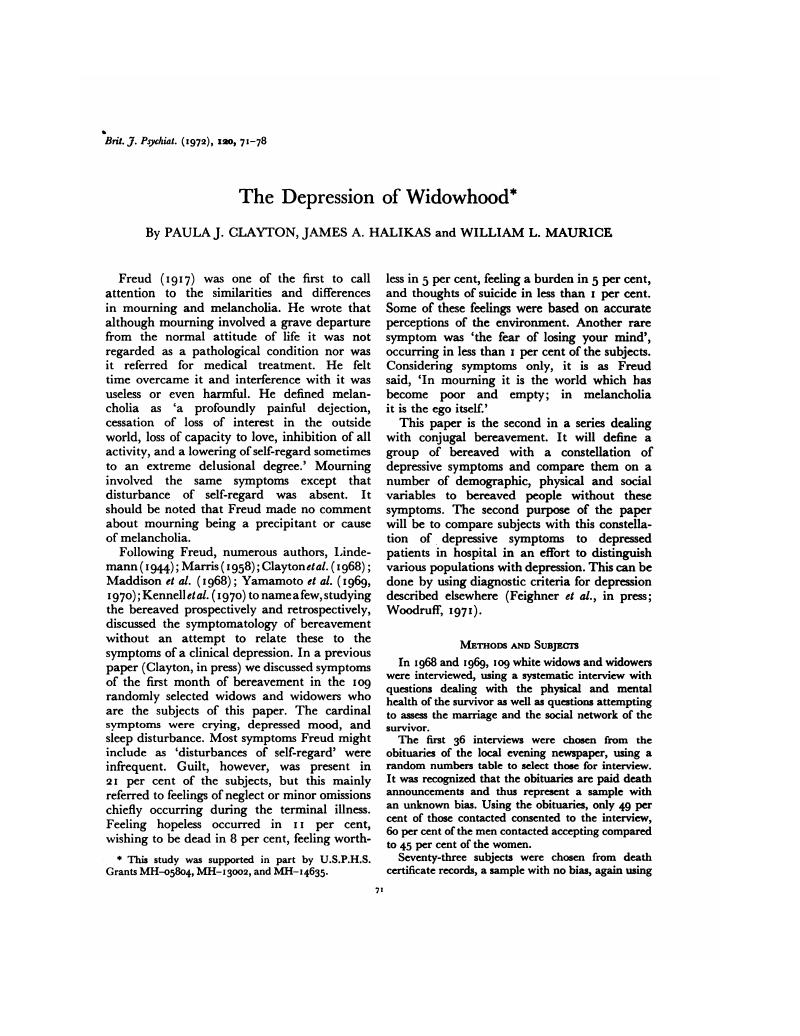The Depression of Widowhood | The British Journal of Psychiatry | Cambridge Core (original) (raw)
Abstract
An abstract is not available for this content so a preview has been provided. Please use the Get access link above for information on how to access this content.

References
Clayton, P. J., Desmarais, L., and Winokur, G. (1968). ‘A study of normal bereavement.’ American Journal of Psychiatry, 125 (2), 168–78.Google Scholar
Clayton, P. J., Halikas, J. A., and Maurice, W. L. (1971). ‘The bereavement of the widowed.’ Journal of Nervous and Mental Disease .Google Scholar
Feighner, J. P., Robins, E., Guze, S. B., Woodruff, R. A. Jr., Winokur, G., and Munoz, R. (1971). ‘Diagnostic criteria for use in psychiatric research.’ Archives of General Psychiatry .Google Scholar
Freud, S. (1917). ‘Mourning and melancholia.’ In The Complete Psychological Works of Sigmund Freud, Vol. XIV , London: Hogarth Press, 243–58.Google Scholar
Helgason, T. (1961). ‘Frequency of depressive states within geographically delimited population groups.’ In Depression (ed. Kristiansen, E. S.), Acta Psychiatrica Scandinavica, 37, Suppl. 162, 81–90.Google Scholar
Kendell, R. E., and Gourlay, J. (1970). ‘The clinical distinction between psychotic and neurotic depression.’ British Journal of Psychiatry, 117, 257–60.Google Scholar
Kennell, J. H., Slyter, H., and Klaus, M. H. (1970). ‘The mourning response of parents to the death of a newborn infant.’ New England Journal of Medicine, 283 (7), 344–9.CrossRefGoogle Scholar
Lindemann, E. (1944). ‘Symptomatology and management of acute grief.’ American Journal of Psychiatry, 101 (2), 141–8.CrossRefGoogle Scholar
Loewenstein, R., Colombotos, J., and Elinson, J. (1962). ‘Interviews hardest-to-obtain in an urban health survey.’ Proceedings of the Social Statistics Section of the American Statistical Association.Google Scholar
Maddison, D., and Viola, A. (1968). ‘The health of widows in the year following bereavement.’ Journal of Psychosomatic Research, 12, 297–306.CrossRefGoogle Scholar
Maddison, D., and Walker, W. L. (1967). ‘Factors affecting the outcome of conjugal bereavement.’ British Journal of Psychiatry, 113, 1057–67.Google Scholar
Marris, P. (1958). Widows and Their Families. London: Routledge and Kegan Paul.Google Scholar
Munoz, R. A., Marten, S., Gentry, K. A., and Robins, E. (1971) ‘Mortality following a psychiatric emergency room visit: an eighteen month follow-up study.’ American Journal of Psychiatry, 1281, 220–23.Google Scholar
Winokur, G., and Clayton, P. (1967). ‘Family history studies: I. Two types of affective disorders separated according to genetic and clinical factors.’ In Recent Advances in Biological Psychiatry, Vol. 9 (ed. Wortis, J.). New York: Plenum Press, 35–50.CrossRefGoogle Scholar
Woodruff, R. A. Jr. (1971). ‘Unipolar and bipolar primary affective disorder.’ British Journal of Psychiatry, 119, 33–38.Google Scholar
Yamamoto, J., Okonogi, K., Iwasaki, T., and Yoshimura, S. (1969). ‘Mourning in Japan.’ American Journal of Psychiatry, 125 (12), 1660–65.Google Scholar
Yamamoto, J., and Imahara, J. (1970). ‘America and Japan—two ways of mourning.’ Google Scholar